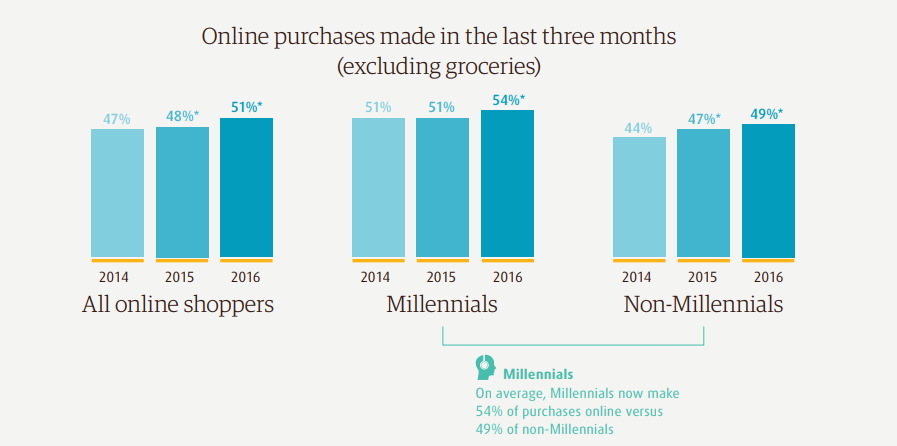Data is everywhere. We gather and share countless data every moment, in fact, even our actions are generating data right now. Things that we used to see in sci-fi movies have now become real. With us being surrounded by so much data, managing them has become very challenging, but then big data is here!IoT, AI, Blockchain, Big Data: you might be seeing or hearing about these phrases a lot lately. With our world turning digital in every way, knowing these concepts and their functioning is becoming imperative. So what is Big Data exactly, and how it is impacting the ecommerce industry? Big Data Analytics is the way of examining a voluminous amount of data in order to unearth hidden patterns, correlations, market trends, consumer preferences and other insights that can help businesses to modify accordingly.Data differ in volume, variety, and velocity. They can be structured data like SQL database stores; unstructured data like document files; or streaming data from real-time sensors used in the IoT. Although the concept is nothing new as businesses used to manually analyze their data earlier, with Big Data, there are multiple benefits like time and cost saving, efficiency, smarter business moves, more efficient operations, higher profits, and happier customers. eCommerce is a successful and most-preferred sector in the industry, which has changed the way of buying and selling goods and services. The speed with which the ecommerce industry is booming, it is expected to hit $4.5 trillion in 2021 (according to a Statista report). On average, 54% of millennials are now making online purchases compared to 49% of non-millennials. Check out this image taken from the official report of the United Parcel Service of America, Inc.
1. Enhanced Shopping Experience
Data mining with Big Data helps in understanding a shopper very closely. A shopper may not realize that every click of his/her is being monitored continuously. Right from entry to exit, whatever a shopper explores is recorded. Based on that, the seller digs out their browsing interest and purchase history and get a catch of their shopping pattern as in what their demand is and when do they buy most. With Big Data, ecommerce sellers have benefitted in managing their inventory as well. They are now able to organize customers based on their shopping pattern, demographic details and time period and thus offload their excess stock accordingly. Like in the evening or festive seasons, the highest purchases occur, hence some online store owners alter the price of their products/services during that period of time and even run social media marketing ads to attract customers.Last but not least, Big Data has made it possible to retarget customers easily. By recommending the items of their interest after studying a shopper’s pattern, ecommerce is producing a higher level of customer satisfaction with optimum customer experience.
2. Increased Sales With Customized Offers and Recommendations
Another one of the benefits of big data for ecommerce businesses is that ecommerce stores have gained increased sales. With the help of customer behavioral analysis, e-retailers are now able to customize their offers and recommendations, providing more interactive and rich customer experience. By running campaigns, giving coupons and discounts based on past spending records, they are now attracting huge traffic and good returns. Moreover, Big Data has also helped e-retails in recommending products and reminding pending purchases. For example, recommending a shirt that goes well with the pair of jeans, increases the sales as well customer’s satisfaction.
3. Better Customer Service
The ultimate success lies in how the customer feels. Poor service can turn off a customer forever. Hence to continue providing them with the best, Big Data has been very helpful. Using Big Data, e-retailers are constantly monitoring the shopping experience of the customer so as to provide them better responses for their needs. From answering their query to keeping them informed about new offers and tracking their items, Big Data is helping online store owners in maintaining stronger and longer-lasting customer relationships. After all, the happier the customers, the more they will indulge in the services offered.
4. Inventory Management
One of the best benefits of Big Data is that now e-retailers are capable to keep a track of their inventory and stock them timely so as to meet the customers’ demands. It has become extremely beneficial for ecommerce providers to know the demand for the product on their site and grab that opportunity to later supply the products that a customer is looking but is not available in the store at present.
5. Future Planning
By analyzing customer behavior, e-retailers are now capable of planning out their future business plan very well. By knowing the demands of customers, they can now plan their inventory accordingly and stock up enough to fulfill the peak period.
In a nutshell
Big Data has brought about an incredible change in the ecommerce industry but still, there are infinite possibilities yet to be explored. Many of the companies have already started using Big Data for real-time analysis for improved sales and higher profits by providing on-the-spot customer service. The next big thing will be merging IoT and Big Data, the outcomes of this deadly combination will definitely take the ecommerce industry to a whole new level.